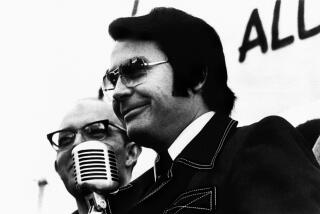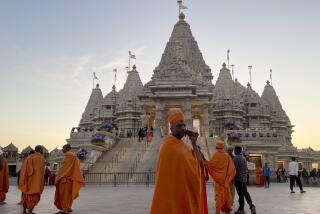A Swami in the Cold Awaits Sentencing for Racketeering
LITTLETON, W. Va. — Swami Bhaktipada once was the spiritual leader of the country’s largest Hare Krishna commune, a showplace with a lavish temple in West Virginia and devotees raising funds from Maine to California.
Now Bhaktipada lives in seclusion in a stone cabin at an abandoned quarry near this small town, excommunicated by his religion and awaiting sentencing for racketeering. He faces up to 20 years in prison.
He says, however, that he is at peace.
“Not a blade of grass moves without God’s purpose. I’m content in that,” Bhaktipada said. “If he wants to put me in prison, I should not object any more than if he put me in a palace.”
Bhaktipada was accused of using murder, kidnapping and beatings to protect a racket that raised more than $10 million through the illegal sale of bumper stickers and baseball caps bearing copyrighted and trademarked logos.
Last month in U.S. District Court in Martinsburg, Bhaktipada admitted mail fraud related to fund-raising and to obtaining insurance for vehicles used by the New Vrindaban commune. But he admitted no responsibility for the slayings of two Krishna dissidents, the crux of the federal case.
“The mail fraud happened while I was in charge of the community, therefore I had something to do with it. It was not done at my insistence, but I was aware of it. Therefore, I take responsibility,” he said.
Bhaktipada, 58, born Keith Ham in Peekskill, N.Y., moved to the area in 1968 to open a modest temple on a 130-acre farm near Moundsville, about 60 miles southwest of Pittsburgh.
New Vrindaban, named after the place where believers say the Hindu god Krishna appeared 5,000 years ago, expanded to 4,000 acres, with dormitories, a restaurant and the Palace of Gold, a temple of marble and gold. The hilltop community grew to 700 devotees by the mid-1980s, and more than 250,000 tourists visited each year.
But evil lurked under the idyllic life of meditation and self-sustenance, prosecutors said.
New Vrindaban sent followers across the country seeking donations for nonexistent charities and made millions by selling the items with logos from 1980 to 1985, prosecutors said.
They contended that Bhaktipada’s greed drove him to order the killings of two former devotees who spread rumors that the swami was a homosexual and a child abuser.
In 1987, Bhaktipada and the entire New Vrindaban commune were excommunicated by the International Society for Krishna Consciousness, which cited his attempts to Westernize the religion.
“There was God’s law and there was secular law, and Bhaktipada obeyed neither. He was above it,” said Saudamani devi dasi from the international society’s office in Philadelphia.
Bhaktipada remains defiant about mingling Krishna tenets with other religious practices, such as the American Indian sweat lodge ritual.
“It’s a religious war,” Bhaktipada said. “They look on me as a demon who has contaminated the pure nectar that Krishna gave us.”
Now, in his cabin 26 miles southeast of New Vrindaban, Bhaktipada lives surrounded by theology books, Indian spices, a pair of German shepherds and the sounds of crickets and frogs.
In one corner is an altar festooned with silk flowers and a photograph of Swami Prabhupada, Bhaktipada’s mentor. Bhaktipada kneels there each morning for prayer despite health problems. He has used a cane since a 1985 beating by a follower who said he wanted to “cleanse the community.”
There is no electricity or running water. A camping stove is used to boil water and a wood stove constructed from a 40-gallon oil drum provides heat.
In an interview, Bhaktipada maintained that he had nothing to do with the slayings of the dissidents.
Another devotee was convicted of both murders and is serving two life sentences.
Others, including Bhaktipada’s fund-raising chief, were convicted of charges including conspiracy, mail fraud and racketeering.
“It’s difficult,” Bhaktipada said. “These people are like my children. I gave my life for them.”
Now the remaining 225 residents of New Vrindaban want to regain acceptance into the international society and get on with their lives, said David Waterman, a member of the community’s board of directors. The commune paid $100,000 in March to settle federal charges over the racketeering scheme.
Bhaktipada said his decision to accept guilt provides a clean slate for entering the spiritual world in the afterlife.
“The sun breaks through after the storm,” he said. “Clear skies follow.”
More to Read
Sign up for Essential California
The most important California stories and recommendations in your inbox every morning.
You may occasionally receive promotional content from the Los Angeles Times.










